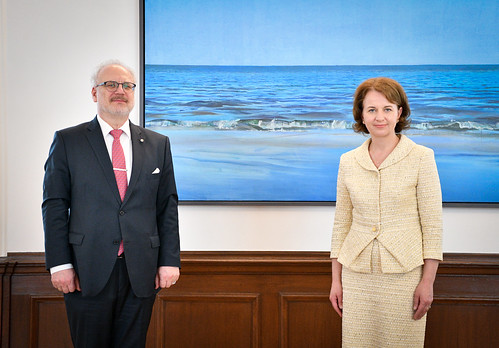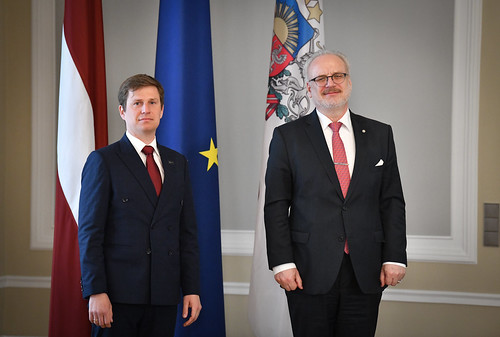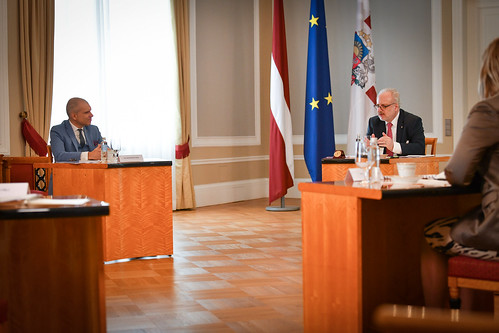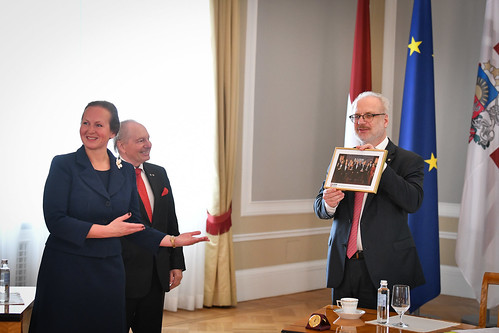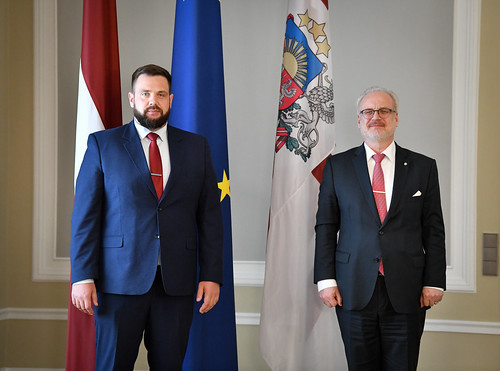President met with Evita Simsone, Director of the State Employment Agency (SEA), and discussed how Covid-19 crisis has affected current employment opportunities and agency’s employment promotion plans. According to Egils Levits, crisis has facilitated transformation of SEA into ‘national human resource management agency that changes people’s views about employment and promotes new, modern types of jobs’. Egils Levits and Evita Simsone agreed that easing of official requirements for accreditation of training programmes for unemployed and scaling up of work-based training programmes for future employment is required. Head of SEA underlined that the agency is shifting its focus and putting increasing emphasis on career guidance, needs of employers and on-the-job training of unemployed.
President’s meeting with Kaspars Rožkalns, Director of Latvian Investment and Development Agency (LIAA), focused on agency’s support to export companies. LIAA is currently in the process of producing a series of 8 video clips that will showcase Latvia’s Covid-19 pandemic success story. Latvia successfully builds on new technologies and explores new export opportunities. Kaspars Rožkalns underlined that in order to bring more investment to regions, Latvia must change its tax system to provide more incentives for local governments to bring in more foreign business. For example, by giving municipalities a share of corporate tax from new FDIs. ‘What we are clearly learning in this crisis is that there are companies and sectors that know how to keep their exports and quickly and efficiently adjust to new situation, and then there are those who do not,’ said the head of LIAA.
Egils Levits also met with Aigars Rostovskis, Chair of the Council of Latvian Chamber of Commerce and Industry (LCCI), and Jānis Endzinš, COB of LCCI, to exchange views on how Covid-19 pandemic has affected the local businesses and their growth, competitiveness and exports. It was underlined that imbalances caused by mismatch between export volumes and productivity levels must give businesses clearer understanding of what post-crisis transformations are needed to produce higher added value products. It was also stressed that crisis has forced many countries to rethink their industrial policies and increase their technology uptake. Latvian companies that want to stay integrated into supply chains despite the new context must keep modernising.
One of the main topics discussed during President Levits’ meeting with Vitālijs Gavrilovs, President of Employers' Confederation of Latvia (LDDK), and Līga Meņģelsone, Director General of LDDK, was the role of LDDK in helping the government finalise economic recovery strategy. Representatives of LDDK stressed that, once strategy is adopted, transformation of economy and boosting of productivity, as well as development of human capital and business environment, should begin immediately. These strategic steps are vital for economic recovery of Latvia. On changes in business environment, Vitālijs Gavrilovs asserted that successful development of companies depends on availability of bank loans.
President of Latvia Egils Levits stressed that ‘we must now focus all our energy and resources on overcoming the crisis. We must make sure we come out of it stronger. It is crucial to make smart choices when it comes to spending additional recovery funding. We should invest in sectors and companies with highest potential. As for people who have temporarily lost their jobs or are in between jobs, reskilling and upskilling is the crisis exit strategy for them’.
Egils Levits also met with Minister for Economics Jānis Vitenbergs. President and Economics minister talked about the main points of government economic recovery strategy and public and private infrastructure investment plans. Egils Levits and Jānis Vitenbergs agreed that to facilitate sustainable economic transformation, and thus promote growth of Latvian exports, recognition, competitiveness and confidence of international partners, this strategy must give clear future vision on how sectors like science, smart technologies, bioeconomics, biomedicine, ICT solution, digital skills and others will develop. President said: ‘We have a couple of months to define government’s economic priorities and start frontloading the funding. For the first time ever, we are in a situation that requires great precision and foresight.’





